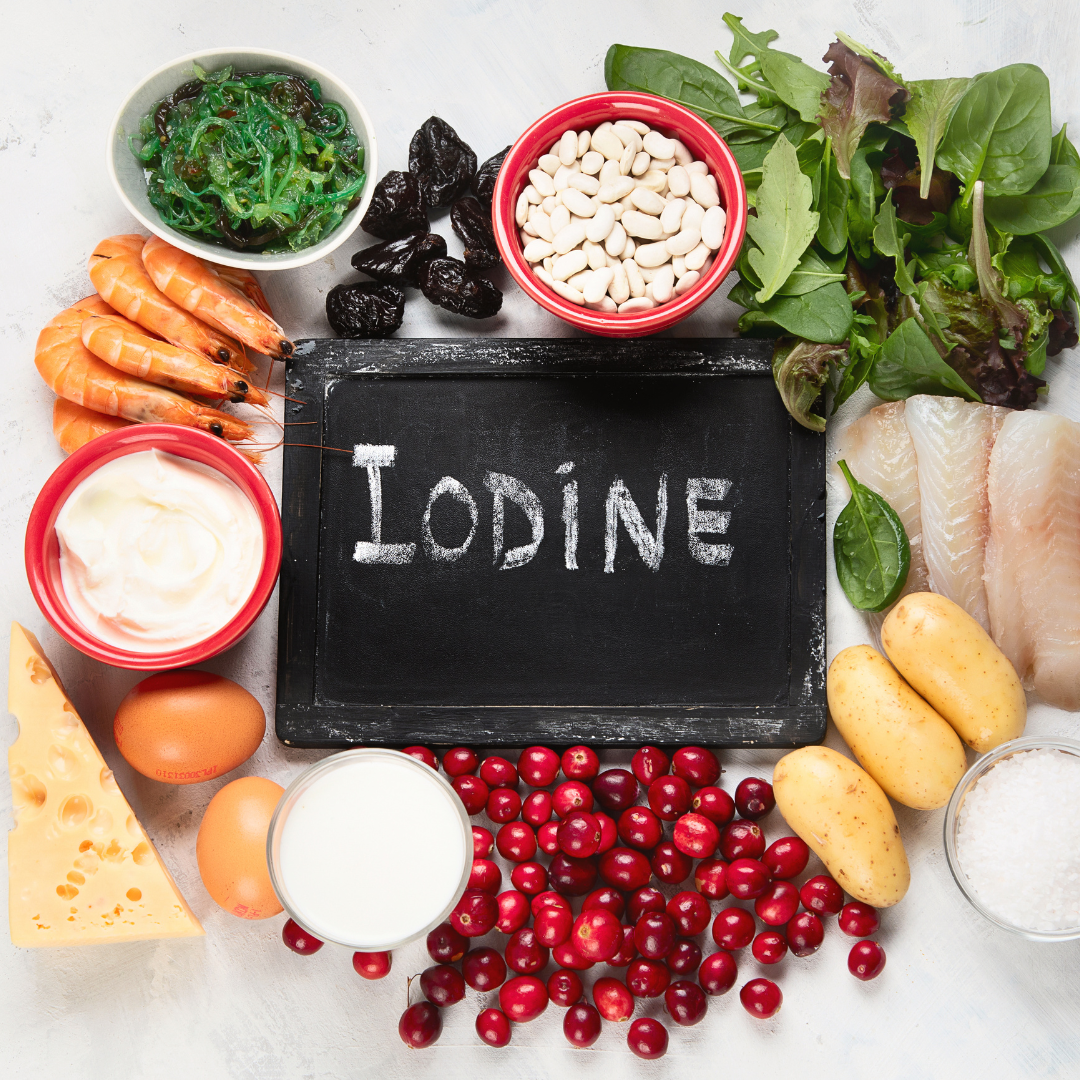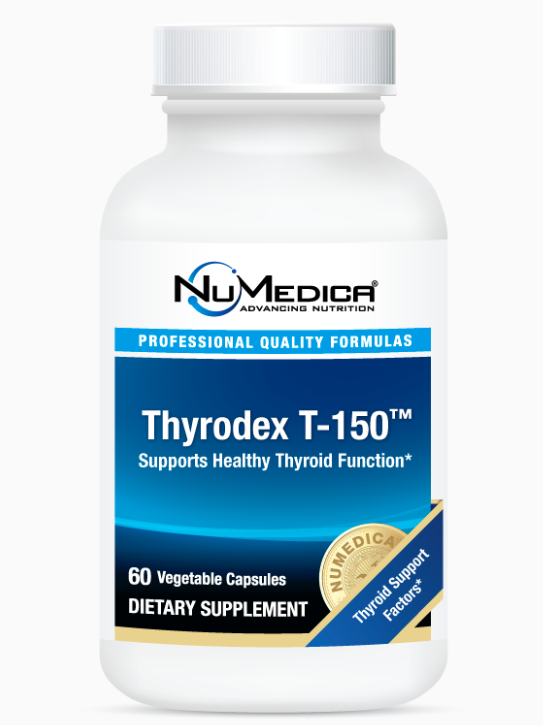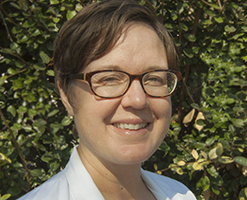
Your thyroid is the main organ that controls how wonderful and energetic you feel. When you wake up full of energy, happy, and eager to start the day, you can thank your thyroid. Your body weight is also maintained by this tiny gland in the lower part of your neck.
It’s when we feel not-so-great that we stop thanking the thyroid. Fatigue, foggy thinking, weight gain, depressive mood, thinning hair, dry skin, constipation and feeling cold especially in feet and hands – all are signs your thyroid is not working hard enough, a condition called hypothyroidism. It is estimated that 5% of the US population are hypothyroid.(1)

Why would your thyroid do this to you? Well, thyroid issues are rarely thyroid issues. Solving this little riddle actually gets you to the understanding of what’s behind the dysfunction. A low-functioning thyroid usually suggests one (or a combo) of three things – lack of key nutrients, stress, and/or autoimmune attack.
Thyroid Hormones
The Thyroid Stimulatory Hormone (TSH) is a basic blood value to determine if you have established hypothyroidism. TSH is a message from the pituitary gland in your brain to the thyroid to stimulate the release of the thyroid hormones (T4 and T3). If the TSH is elevated (above 4.2 mIU/L) then you have hypothyroidism.(2) Often used as a screening test, many times the TSH will be run to let the provider know if you are in need of medication. To find out what is imbalanced with the thyroid, you need to have a deeper investigation.
Free T3 and Free T4 are the actual thyroid hormones produced from the thyroid gland itself. T4 is converted into T3 – the “active” thyroid hormone, known for keeping your basal metabolic rate. T3 stimulates the nervous system to make you feel “awake”. It also supports cardiac output, glucose and fatty acid metabolism, respiration rate, and reproductive hormone regulation.(3) When both T4 and T3 are low, we know that iodine is low. In fact, the most common reason for hypothyroidism is iodine deficiency.(4)
Key Thyroid Nutrients
 Iodine is the “rate limiting step” for the production of thyroid hormones.(5) Rate limiting step is a chemistry term that means if you don’t have iodine, you don’t make thyroid hormones. Much like if you were making a cake, and you run out of flour, you can’t make any more cake. Flour would be the rate-limiting step for your cake production.
Iodine is the “rate limiting step” for the production of thyroid hormones.(5) Rate limiting step is a chemistry term that means if you don’t have iodine, you don’t make thyroid hormones. Much like if you were making a cake, and you run out of flour, you can’t make any more cake. Flour would be the rate-limiting step for your cake production.
Iodine is actually an essential nutrient for the body – meaning you have to eat or drink it and if you don’t get enough, you will have pathology. The Recommended Daily Allowance of iodine is 150 mcg per day (for adults). When the levels fall below 100 mcg per day, the TSH will increase and you will be hypothyroid.(6)
Other key nutrients for the thyroid are selenium and tyrosine. T4 converts into T3 through the Thyroid Peroxidase enzyme and the car keys to that enzyme is selenium. You can spot a selenium deficiency when T4 is normal or high and T3 is low in the bloodwork.
Tyrosine is an amino acid that helps the structure of thyroglobulin, the protein precursor for thyroid hormones.(7) Tyrosine is also the amino acid precursor to dopamine, so when low, you can have both low dopamine and low thyroid. This can heavily influence the mood. Many times low dopamine contributes to low mood, feelings of sadness, irritability, and depression. These are also mood similarities to hypothyroidism. Even when evaluating depression, always check the thyroid to see if it is contributing to that feeling.
 It is quite common to be low in these key nutrients. While prescriptions do change the thyroid lab values, if fatigue, dryness, low mood, or other thyroid symptoms don’t improve, adding this support makes a big difference. Supplements like Thyrodex by NuMedica or Thyroid Support Complex by Pure Encapsulations provide these nutrient basics.
It is quite common to be low in these key nutrients. While prescriptions do change the thyroid lab values, if fatigue, dryness, low mood, or other thyroid symptoms don’t improve, adding this support makes a big difference. Supplements like Thyrodex by NuMedica or Thyroid Support Complex by Pure Encapsulations provide these nutrient basics.
The Impact of Stress on Your Thyroid
Worry, tension, burning the candle at both ends, not resting enough – all of this adds up and has a major impact on your thyroid. Cortisol (the main stress hormone from the adrenal glands) slows the conversion from T4 to T3 and then deactivates your thyroid hormones. The Reverse T3 is a metabolically inactive T3, and measuring through bloodwork it can indicate cortisol’s impact on the thyroid. If Reverse T3 levels are high, even if you are taking thyroid medications, your stress is negatively impacting this therapy.(8)
Many times, resistant weight loss, sleep disturbance, fatigue, and mood issues are contributions from both the adrenal stress signal as well as the underactive thyroid. Salivary or urinary adrenal testing, in addition to measuring Reverse T3 in the blood, helps truly understand this dynamic.

Autoimmunity
Hashimoto’s Thyroiditis is an autoimmune disorder that attacks the thyroid gland to create an underactive thyroid.(9) The antibodies that are measured in the blood are Thyroid Peroxidase Antibody and Thyroglobulin Antibody. Surprisingly, these antibodies to the thyroid can be present several years before the thyroid labs reflect hypothyroidism. In fact, researchers in 2011 found that antibodies could be present an average of 7 years before clinical diagnosis.(10)
Stabilizing the underlying conditioning for autoimmune dysfunction means concentrating on reversing leaky gut syndrome. With autoimmune hypothyroidism, merely medicating is not a sole solution. You have to clean up the diet and digestive issues in addition to taking medications to truly get to symptom resolution. Working with a functional medicine doctor or naturopathic doctor will help you through this.
In summary, fixing your thyroid is less about knowing that you have hypothyroidism and more about knowing WHY you have hypothyroidism. Many times, it is not enough just to medicate: you are likely missing key nutrients, have stress that is working against you, and may even have an autoimmune issue going on. None of these underlying issues go away with just medication alone. While your labs look better, if you are stillI feeling the classic hypothyroid symptoms, you may need to investigate this further.
If you have comments and/or questions about this blog, email us at blog@peoplesrx.com.

Amy Nelson, ND* received her Naturopathic Doctorate from the National College of Natural Medicine in Portland, OR where she studied nutrition, homeopathy, herbal and functional medicine. In addition, Dr. Nelson was the Associate at The IBS Treatment Center in Santa Monica where she treated irritable bowel syndrome and complex food allergies. Dr. Nelson utilizes her experience in natural medicine to address female and male hormonal imbalances, mental health, and digestive disorders. Amy is available for consultation at Peoples Lakeline.
*Although licensed in other states, Naturopathic Doctors are not currently licensed in Texas.
References:
- https://www.thyroid.org/media-main/press-room/
- https://www.merckmanuals.com/professional/endocrine-and-metabolic-disorders/thyroid-disorders/hypothyroidism
- Armstrong M, Asuka E, Fingeret A. Physiology, Thyroid Function. [Updated 2022 Mar 18]. In: StatPearls [Internet]. Treasure Island (FL): StatPearls Publishing; 2022 Jan-. Available from: https://www.ncbi.nlm.nih.gov/books/NBK537039/
- Chung HR. Iodine and thyroid function. Ann Pediatr Endocrinol Metab. 2014 Mar;19(1):8-12. doi: 10.6065/apem.2014.19.1.8. Epub 2014 Mar 31. PMID: 24926457; PMCID: PMC4049553.
- Zimmermann MB. Iodine deficiency. Endocr Rev. 2009 Jun;30(4):376-408. [PubMed abstract]
- https://ods.od.nih.gov/factsheets/Iodine-HealthProfessional/#h10
- Coscia F, Taler-Verčič A, Chang VT, Sinn L, O’Reilly FJ, Izoré T, Renko M, Berger I, Rappsilber J, Turk D, Löwe J. The structure of human thyroglobulin. Nature. 2020 Feb;578(7796):627-630. doi: 10.1038/s41586-020-1995-4. Epub 2020 Feb 5. PMID: 32025030; PMCID: PMC7170718.
- Seeling W, Altemeyer KH, Butters M, Fehm HL, Loos U, Mayer R, Nabjinsky M, Schmitz JE. Glukose, ACTH, Kortisol, T4, T3 und rT3 im Plasma nach Cholezystektomie. Vergleichende Untersuchungen zwischen kontinuierlicher Periduralanaesthesie und Neuroleptanalgesie [Blood glucose, ACTH, cortisol, T4, T3 and rT3 after cholecystectomy. Comparative studies of continuous peridural anesthesia and neuroleptanalgesia]. Reg Anaesth. 1984 Jan;7(1):1-10. German. PMID: 6324295.
- https://www.niddk.nih.gov/health-information/endocrine-diseases/hashimotos-disease#whatis
- Hutfless S, Matos P, Talor MV, Caturegli P, Rose NR. Significance of prediagnostic thyroid antibodies in women with autoimmune thyroid disease. J Clin Endocrinol Metab. 2011 Sep;96(9):E1466-71. doi: 10.1210/jc.2011-0228. Epub 2011 Jun 29. PMID: 21715532; PMCID: PMC3167665.
